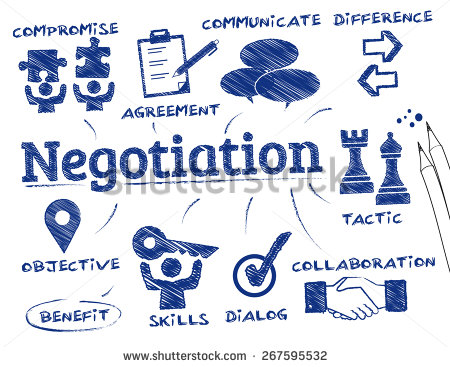22 Tactics for Successful Business Negotiations
“For some people, negotiating comes as second nature. The rest of us need to carefully study and learn negotiation strategies to be sure we don’t end up on the losing end of business deals”. Wiz4.biz
Negotiations Topics: Preparations, Advisor/s, Ask Questions, Listen, Understand, Benefits & Wants, Win-Win, Compromises, Patience, Walk-Away, 1st Offer, Conceding, Fixate, Draft before, Document the Final Deal asap.

Today in business you don’t always get what you ask for. Sometime you have to negotiate. Everybody wants to know “What’s in it for me?” So for you to get what you want, you’d better be prepared to answer that question for the people you do business with – by learning Negotiations strategy.
Wiz4.biz
A. Preparation for Negotiation
#1. Being Prepared includes a lot of things you may need to do. Do as much as you need – to be sufficiently prepared – as the situation merits.
- Review and understand thoroughly, the business of the other party by reviewing their website, their press releases, articles written about their company, etc. (Google, LinkedIn, etc)
- If you don’t know them well, review the background of the person you are negotiating with by reviewing any Bio on the company’s site, the person’s LinkedIn profile, and by doing a Web search for
- Review what similar deals have been completed by the other side, and the terms.
- Understand the offerings and pricings from competitors of the party you are negotiating with.
#2. Know what U What & what They Want. What is it you want from the negotiation? Don’t wait for the other party to state their position to determine what yours is going to be.
- Write these things down as a Wish List of all the things you do want before you begin.
If not, you may look back and find you were coerced into accepting terms for things you didn’t want or need to begin with.
B. Negotiating Strategy
#3.. Get the help of the best Advisor/s. If it’s a big or complicated deal, you want real expertise on your side helping you in the negotiations and drafting the Deal. Sometimes, these advisors don’t come cheap, but are worth it if you get a good Deal.
#4. Ask the “right” Questions. Don’t be afraid to. The answers can be informative for the negotiations. Depending on the type of deal, you could ask:
- Is this the best offer you can give me?
- What assurances do I get, that your solution will actually work for me?
- How does our deal benefit you?
- What else can you throw in to the deal without any cost to us? (A particularly useful question to ask car dealers.)
#5. Listen to & understand the other party’s Issues & Point of view. The best negotiators are the ones who listen to the other side, understand their key issues & hot buttons, then formulate an appropriate response. Try to gain an understanding about what is important or mandatory to the other side, what limitations they may have, and where they may have flexibility.
#6. Understand the Deal Dynamics. Understanding this is crucial in any negotiation. So be prepared to determine the following:
- Who has the leverage in the negotiation? Who wants the deal more?
- What timing constraints is the other side under?
- What alternatives does the other side have?
#7. Match your Benefits to their Wants. For you to expect anyone to give you anything, you know you have to provide value, benefits, to them. Now that you know what they want, examine your list of attributes for yourself or your company, and look for matches to the needs of your negotiating counterpart. Expert negotiators will find unfulfilled wants that the other party has – that weren’t mentioned – and point out how doing a Deal with you will satisfy them.
#8. Seek “Win-Win” Opportunities. There has to be winners on both sides of the table, so look for gaps that you can fill and look how the other party can fill your gaps. Every company & individual is different with different needs & wants. Use that to your advantage. Something that has little cost to you in concession may be a major “coup” for the people you’re doing business with. Let them have it, because the reciprocal situation applies for you. Everybody wins if all sides keep the needs of their opposition in mind instead of thinking about defeating them. Opportunities will surface that you never imagined possible.
#9. Find “Workable” Compromises. Certain things you cannot live without, but others you’re flexible. Know in advance where you can be flexible and just how flexible you can be (Gumby or Plastic-Man?). Any time you give in on a point in one area, such as terms of payment, it is perfectly acceptable and expected that the other party will flex somewhere else. As long as you keep from flinching on your critical negotiation goals, you can find compromises that allow both sides to come together in the middle without losing anything of real value.
#10. What Hill will you Die On? In any negotiation you will need to make Concessions – if for no other reason – than to allow the other party to feel they have gotten something out of the negotiation. Decide in advance what are the key Concessions you will not make—what’s really important to you. Don’t die on a hill that ain’t worth dying on.
#11. Be Patient. Lack of on your part can make you look like an amateur and kill a deal. Hold back on discussing your “self-imposed” deadlines that reveal to your adversary that you might be had a little easier to meet a timetable.
#12. Stick to your Guns. If you offer a good proposal and know it, stand by it! Don’t let fear, disrespect from your opposition, or chiding language, make you back off from your position. Let them blow off their steam, telling you how ridiculous your argument is while proving nothing, and then re-emphasize how they will “win” by doing business with you. Put the ball in their court by asking them how to show you there is no value in your offer. It’s easy to throw stones. It’s much more difficult to prove those stones were deserved. Don’t back down. Walk away if they wont compromise.
#13. Be prepared to “Play Poker” and be ready to “walk-away” from the Deal . . . if the terms of the deal aren’t up to your liking. This is easier said than done, but is sometimes critical to get to an end game. Know before you start what your target price & walk-away price is. Be prepared with market data (if appropriate) to back up why your price is reasonable, and if you are confronted with an ultimatum that you absolutely can’t live with, be prepared to walk away.
C. Behavior during Negotiations
#14. Keep the negotiations Professional & Courteous. Nobody really wants to do business with a difficult or abusive personality. After all, even after the negotiations are concluded, you may want to do business with this person again, or the transaction may require ongoing involvement. Establishing a good long-term relationship should be one of the goals in the negotiation. A collaborative, positive tone in negotiations is more likely to result in progress to a closing.
D. Dont’s during Negotiation
#15. Never accept the First Offer. Counter-offers and some back-and-forth negotiation will most likely lead to the two parties being satisfied that they struck the best deal they could, and thus be more committed to closing the deal.
#16. Always avoid the “bad” Strategy of Negotiating by continually “conceding”. Continually conceding points (while not getting anything in return) can lead to the exact opposite of what you are hoping for. If you are conceding a point, make sure to try and get something in return.
#17. Never “under-cut” your Value. Don’t concede on price or terms without narrowing the scope of service or demanding equivalent concessions. If you are willing to take a hit to your bottom line in exchange for nothing, your credibility goes to zero, now and in the future. If you do it once it becomes expected. Furthermore, it leads to mistrust, because you just proved you did not give your best deal from the get-go. Any time you concede anything in a negotiation, make sure that you show value is less from your side or demand equivalent value from their side.
#18. Don’t get “hung-up” on one Issue. You want to avoid getting stuck on a seemingly impossible issue. Sometimes it’s best to suggest that an issue be set aside for the moment and both parties move on to make progress on other issues. A creative solution may come to you later outside the heat of the negotiation.
#19. Don’t “fixate” on the Deal on the table and ignore Alternatives. In many situations you want to have competitive alternatives. This can enhance your negotiating position and allow you to make the best decision as to how to proceed. By negotiating simultaneously with two or more parties, you can usually obtain better terms than with only one party.
#20. Time is the “enemy” of many Deals. The longer a deal takes to get completed, the more likely that something will occur to derail da Deal. So be prompt at responding, turn documents around quickly, and keep the deal momentum moving. However, that doesn’t mean you should rush through negotiations and make concessions that you don’t need to make.
E. Prepare for the Close.
#21. Always Draft the 1st version of your proposed Agreement. This lets you frame how the deal should be structured, implement key points that you want – that haven’t been discussed and gets momentum on your side. The other party will be reluctant to make extensive changes to your document (unless it is absurdly one sided), and therefore, you will have already won part of the battle by starting off with your “preferred“ terms.
#22. Document the Final Deal during the session.
Why? 1) tomorrow memories may think of the Deal differently. 2) many times negotiations occur between the leaders of organizations or people who guide the operation, but have no legal background. As soon as the lawyers and see the agreement, the items may be questioned. Oh yeah, it’s true.
Summary:The next time you’re in a situation where there is give and take, remember a negotiation is taking place, whether you call it that or not. Apply these tactics to your situation and watch with wonder as you get a darn good deal.

Comments: Do you know of any other Tactics to assure a successful Negotiation?
from Forbes & Biz KnowHow 5/19 enhanced by Peter/CXO Wiz4.biz
For more Info, click on Negotiations, Successful.
